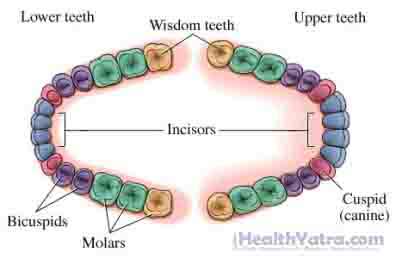परिभाषा
An impacted tooth is a tooth that is positioned against another tooth, bone, or soft tissue so that it is unlikely to fully erupt through the gums to reach its normal position in the mouth.
Impaction typically occurs in the third molars, also called “wisdom teeth.” Left untreated, about one in three people with an impacted tooth will develop a cyst in the soft tissue beneath the gum line, or other complications. Impaction can lead to tooth decay, gum inflammation or infection, and resorption of bone or adjacent teeth. An impacted tooth can also push against other teeth, causing misalignment of the bite.

का कारण बनता है
Wisdom teeth, which begin to develop around age 9, are most vulnerable to impaction because they are the last teeth to erupt—usually between the late teens and early 20s. By then, the jaw has stopped growing and may be too small to accommodate these four teeth.
An impacted tooth remains embedded in soft gum tissue or bone beyond its normal eruption time. The cause may be overcrowding. Teeth may also become twisted, tilted, or displaced as the new teeth try to emerge.
जोखिम कारक
Impacted teeth are very common, but having a small jawbone makes you especially vulnerable.
लक्षण
Some people with impacted teeth have no pain or other symptoms. But, you should see a dentist if you experience:
- Pain or tenderness of the gums or jaw bone
- Unpleasant taste when biting down
- बदबूदार सांस
- Redness and swelling of the gums around the impacted tooth
- Prolonged, unexplained headache or jaw ache
- Difficulty opening your mouth (occasionally)
निदान
Your dentist will ask about your symptoms and medical history, and perform a physical exam. Tests may include:
- A visual examination to look for signs of infection or swelling
- Dental x-rays to confirm tooth impaction
उपचार
If an impacted tooth causes no pain, inflammation, infection, and does not affect mouth alignment, no treatment may be necessary. If there are noticeable symptoms, treatment options include the following:
- Over-the-counter pain relievers to ease pain
- Gargling with warm salt water (½ teaspoon of salt in 1 cup of water) to soothe gums
Surgery is usually recommended to remove all wisdom teeth, preferably while the patient is young. This may be done by a dentist under local anesthesia if the tooth is exposed and can be easily removed in one piece. For difficult extractions, your dentist may refer you to an oral surgeon; in these cases, general anesthesia or an intravenous sedative may be used.
रोकथाम
There is no way to prevent impacted teeth.
